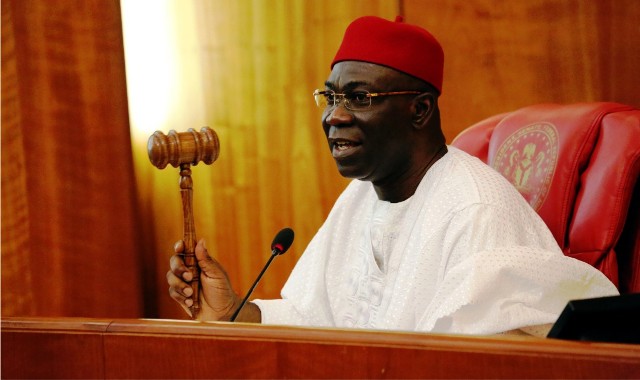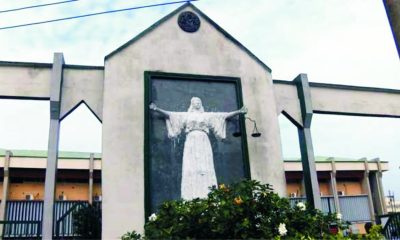News
Decentralise War Against Corruption – Ekweremadu

The Deputy President of the Senate, Senator Ike Ekweremadu, has called for the urgent decentralisation of the war against corruption if it must be won and decisively too.
To this end, Ekweremadu said the political will to fight corruption must be blind to political affiliation, friendship, ethnicity, religion and family, adding that, “It must not only be immune to selectiveness, parochialism, nepotism and double standards, but must be able to command the goodwill, support and legitimacy required to win the battle.”
Ekweremadu, who also called for N50,000 minimum wage and abolition of the Security Vote, advocated the decentralisation of the federal anti-graft agencies and urged the 36 states in the country, to make conscious efforts at setting up anti-corruption agencies, so as to complement the efforts of the federal anti-corruption agencies, in the fight against corruption.
He spoke in Ibadan, Oyo State weekend, where he delivered the 4th National Public Service Lecture of the University of Ibadan Alumni Association, with a theme: ‘Federalism and The Legal Framework for Combating Corruption in Nigeria.’
According to the Senator, a situation where the two major anti-corruption agencies in the country, Independent and Corrupt Practices Commission (ICPC) and the Economic and Financial Crimes Commission (EFCC) do not have presence in the entire country, made the fight against corruption ineffective.
He noted, for instance, that the ICPC had just six zonal offices and nine state offices, in addition to its headquarters in Abuja, while the EFCC had offices in only eight states, apart from its headquarters in Abuja.
Ekweremadu insisted that “these do not scratch the surface, as they are grossly inadequate for a vast area like Nigeria and leave the agencies highly over-stretched.”
On the way forward, he said: “We need far-reaching and in-depth reorientation. Importantly, Nigeria being a federation, the war against corruption must itself be devolved, and federalised, not centralised as is currently the case”.
He added: “To this end, I wish to make the following suggestions: Decentralisation of federal anti-corruption agencies, establishment of State anti-corruption agencies; domestication of anti-graft laws; enthronement of fiscal federalism; decentralised policing, establishment of State orientation agencies, State social intervention /security schemes, State prisons, true economic reforms and public participation in the anti-corruption war.
“Sadly, only Kano state currently has a state agency to fight corruption – the Kano State Public Complaint and Anti-Corruption Commission. This should be emulated, and urgently too, if we must make a headway in the war against graft.
“Similarly, a Code of Conduct Bureau should be established in the states with a Code of Conduct Tribunal to handle cases of civil servants in the states and local government councils. Besides setting up such agencies, there is also the need for the states to domesticate auxiliary federal laws such as the Administration of Criminal Justice Act (ACJA), Fiscal Responsibility Act, among others, to help curb corruption. Rivers, Oyo, Anambra, Enugu, Ekiti, Lagos, and Ondo are the only States that have so far adopted the ACJA”.
He urged the country to discard the current arrangement of ‘robbing Peter to pay Paul,’ to make the war against corruption more effective, since people are more likely to show more interest in how the money they truly worked for was being spent, than one thrown on their laps, for doing little or nothing.
His words: “Entrenching fiscal federalism will replace the current ‘feeding bottle’ arrangement where the centre holds tightly to the purse-string and feeds the components, with a better arrangement that is predicated on self-reliance, hard work, enterprise, resourcefulness, ingenuity, taxation, transparency, and accountability.
“In the various kindred/family meetings, the illiterate farmer or palm wine tapper becomes literate when it comes to how the fines and levies he contributed were spent because it is the product of his sweat, not a windfall from anywhere”.
Listing the various mineral resources in the 36 States of the country, Ekweremadu noted that “The good thing is that every State of the federation is sufficiently endowed to survive from its own resources and sweat”. He also decried a situation where the minimum wage was pegged at N18,000, while some State governors and executives could pocket as much as N2 billion under the cover of Security Vote.
“When a man who earns N18,000 cannot buy a bag of rice, how then can such a person take care of his family? Does it make sense to him if you tell him not to find alternative means of catering to the needs of his family?
“Is it not also possible to abolish the Security Vote and replace it with Contingency Vote so it can be appropriated and accounted for”, he queried.
Ekweremadu, however, observed that “while it is easy to point accusing fingers at the governing elites in public and private sectors, we must all embark on individual soul-searching from the highest to the lowest rung of the social-economic strata”
“From the clerks who would never be able to trace your file unless you grease their palms, to security men who would not let you in or claim that ‘oga no dey’ if you are not the type that parts with ‘kola’ each time you visit, the penchant for corrupt enrichment is definitely not the exclusive malaise of the rich and influential.
“Procurement managers in public and private establishments who have mastered the art of contract inflation and over-pricing; traditional rulers who confer chieftaincy titles on known criminals and corrupt persons; religious leaders and institutions that honour the corrupt are also as guilty as those highly influential persons who clear billions with a stroke of the pen or public office holders who cart away public resources under the cover of Security Vote”, Ekweremadu declared.
News
Shettima In Ethiopia For State Visit

Vice President Kashim Shettima has arrived in Addis Ababa, Ethiopia, for an official State visit at the invitation of the Prime Minister, Dr. Abiy Ahmed.
Upon arrival yesterday, Shettima was received at the airport by the Minister of Foreign Affairs of Ethiopia, Dr. Gedion Timothewos, and other members of the Ethiopian and Nigerian diplomatic corps.
Senior Special Assistant to the Vice President on Media and Communication, Stanley Nkwocha, revealed this in a statement he signed yesterday, titled: “VP Shettima arrives in Ethiopia for official state visit.”
During the visit, Vice President Shettima will participate in the official launch of Ethiopia’s Green Legacy Programme, a flagship environmental initiative.
The programme designed to combat deforestation, enhance biodiversity, and mitigate the adverse effects of climate change targets the planting of 20 billion tree seedlings over a four-year period.
In line with strengthening bilateral ties in agriculture and industrial development, the Vice President will also embark on a strategic tour of key industrial zones and integrated agricultural facilities across selected regions of Ethiopia.
News
RSG Tasks Farmers On N4bn Agric Loan ….As RAAMP Takes Sensitization Campaign To Four LGs In Rivers

The Rivers State Government has called on the people of the state especially farmers to access the ?4billion agricultural loans made available by the State and domiciled in the Bank of Industry.
This is as the State Project Implementation Unit (SPIU) of Rural Access and Agricultural Marketing Project (RAAMP), a World Bank project, took its sensitization campaign to Opobo/Nkoro, Andoni, Port Harcourt City and Obio/Akpor local government areas.
The campaign was aimed at enlightening community dwellers and other stakeholders in the various local government areas on the RAAMP project implementation and programme activities.
The Permanent Secretary, Rivers State Ministry of Agriculture, Mr Maurice Ogolo, said this at Opobo town, Ngo, Port Harcourt City and Rumuodumanya, headquarters of the four local government areas respectively, during the sensitization campaign.
Ogolo said apart from the ?4billion, the government has also made available fertilizers and other farm inputs to farmers in the various local government areas.
The Permanent Secretary who is the Chairman, State Steering Committee for the project, said RAAMP will construct roads that will connect farms to markets to enable farmers and fishermen sell their farms produce and fishes.
He also said rural roads would be constructed to farms and fishing settlements, and warned against any act that will lead to the cancellation of the projects in the four local government areas.
According to him, the World Bank and Federal Government which are the financiers of the programme will not condone such acts like kidnapping, marching ground and other acts inimical to the successful implementation of the projects in their respective areas.
At PHALGA, Ogolo asserted that the city will benefit in the areas of roads and bridge construction.
He noted that RAAMP was thriving in both the Federal Capital Territory, Abuja; Lagos and other states in the country, stressing that the project should also be given the seriousness it deserves in Rivers State.
Speaking at Opobo town, the headquarters of Opobo/Nkoro Local Government Area, the project coordinator, RAAMP, Mr.Joshua Kpakol, said the programme would reduce poverty in the state.
According to him, both fishermen and farmers will maximally benefit from the programme.
At Ngo which is the headquarters of Andoni Local Government Area, Kpakol said roads will be constructed to all remote fishing settlements.
He said Rivers State is lucky to be among the states implementing the project, and stressed the need for the people to embrace it.
Meanwhile, Kpakol said at PHALGA that RAAMP is a project that will transform the lives of farmers, traders and other stakeholders in the area.
He urged the stakeholders to spread the information to their various communities.
However, some of the stakeholders at Opobo town complained about the destruction of their farms by bulls allegedly owed by traditional rulers in the area, as well as incessant stealing of their canoes at waterfronts.
At Ngo, Archbishop Elkanah Hanson, founder of El-Shaddai Church, commended the World Bank and the Federal Government for bringing the projects to Andoni.
He stressed the need for the construction of roads to fishing settlements in the area.
Also, a former Commissioner for Agriculture in the state and Okan Ama of Ekede, HRH King Gad Harry, noted that storage facilities have become necessary for a successful agricultural programme.
Harry also stressed the need for the programme to be made sustainable.
In their separate speeches, the administrators of Andoni and Opobo/Nkoro Local Government Areas, pledged their readiness to support the programme.
At Port Harcourt City, the Administrator, Dr Arthur Kalagbor, represented by the Head of Local Government Administration, Port Harcourt City, Mr Clifford Paul, said the city would support the implementation of the programme in the area.
Also, the administrator of Obio/Akpor Local Government Area, Dr Clifford Ndu Walter, represented by Mr Michael Elenwo, pledged to support the programme in his local government area.
Among dignitaries at the Obio/Akpor stakeholders engagement is the chairman, Rivers State Traditional Rulers Council and paramount ruler of Apara Kingdom, HRM Eze Chike Wodo, amongst others.
John Bibor
News
Tinubu Orders Civil Service Personnel Audit, Skill Gap Analysis

President Bola Tinubu has ordered the commencement of personnel audit and skill gap analysis across all cadres of federal civil servants.
The president gave this directive in Abuja, yesterday, while speaking at the International Civil Service Conference, reaffirming his resolve to achieve efficiency and professional service delivery in the civil service.
“I have authorized the comprehensive personnel audit and skill gap analysis across the federal civil service to deepen capacity. I urge all responsible stakeholders to prioritize timely completion of this critical exercise, to begin implementing targeted reforms, to realize the full benefit of a more agile, competent and responsive civil service,” the president announced.
Tinubu further directed all Ministries, Departments and Agencies (MDAs), to prioritise data integrity and sovereignty in national interest.
He called for the capture, protection and strategic publication of public sector data in line with the Nigeria Data Protection Act of 2023.
“We must let our data speak for us. We must publish verified data assets within Nigeria and share them internationally recognized as fruitful. This will allow global benchmarking organisation to track our progress in real time and help us strengthen our position on the world stage. This will preserve privacy and uphold data sovereignty,” Tinubu added.
President Tinubu hailed the federal civil service as the “engine” driving his Renewed Hope Agenda, and the vehicle for delivering sustainable national development.
He submitted that the roles of civil servants remain indispensable in modern governance, declaring that in the face of a fast-evolving digital and economic landscape, the civil service must remain agile, future-ready, and results-driven.
“This maiden conference is a bold step toward redefining governance in an era of rapid transformation. An innovative Civil Service ensures we meet today’s needs and overcome tomorrow’s challenges.
“It captures our collective ambition to reimagine and reposition the civil service. In today’s rapid, evolving world of technology, innovation remains critical in ensuring that the civil service is dynamic, digital” the President said.
Head of the Civil Service of the Federation, Didi Walson-Jack in her welcome address told the President that his presence and strong words of commendation at the conference has renewed the morale and mandate of public servants across the country.
Walson-Jack described Tinubu as the backbone of driving transformation in the Nigerian civil service, and noted that the takeaways from past study tours undertaken to understudy the civil service in Singapore, the UK and US under her leadership, is already yielding multiplier effects.
Walson-Jack assured Tinubu that her office, in collaboration with reform-minded stakeholders, will not relent in accelerating the implementation of the Federal Civil Service Strategy and Implementation Plan, FCSSIP 25.
She affirmed that digitalisation, performance management, and continuous learning remain key pillars in strengthening accountability, transparency, and service delivery across MDAs.
Walson-Jack reaffirmed that the civil service is determined to exceed expectations by embedding a culture of innovation, ethical leadership, and citizen-centred governance in the heart of public administration.
-
Sports3 days ago
Give Rest Of ‘94 Eagles Their Houses – Amuneke
-

 News3 days ago
News3 days agoRivers High Court Judges Begin 2025 Vacation, July 21
-
Rivers3 days ago
Obalga SOLAD Presents Fire Extinguishers To Council …. Commiserates With traders over Rumuomasi Market Fire
-
Business3 days ago
NPA Assures On Staff Welfare
-

 News3 days ago
News3 days agoFour Internet Fraudsters Get Jail Sentences In PH
-
Sports3 days ago
President Federation Cup: Sanwo-Olu, Abdulrazaq Set To Grace Grand Finale
-
News3 days ago
Senate Confirms Chibudom Nwuche S’South Dev. Commission Chair
-
Rivers3 days ago
FIDA, PCRC Train Police On Paralegal Cases

